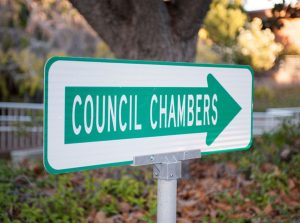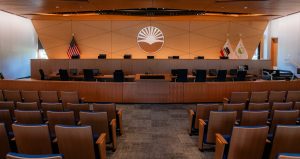The still unresolved multi-year tangle of litigation between the 49ers Stadium Management Company (StadCo) and the City of Santa Clara over billing for golf course parking for Levi’s Stadium events rests on competing definitions of “equitable” and “reasonable.”
The dispute erupted in late 2016 when the City billed StadCo $719,000 for golf course parking for stadium events from January through July 2016. StadCo claimed that not only didn’t they owe that money, but that the City overcharged them $1 million for parking over the previous two years.
The City refused to negotiate and in April 2018, StadCo filed a breach of contract complaint against the City. Several cross complaints followed and the case is currently in mediation.
Fuzzy Language Sets the Stage for Dispute and City Takes a Hard Line
The golf course parking agreement is one among many labyrinthine stadium contracts that the Santa Clara City Council approved prior to the Levi’s Stadium opening in August 2014. It was based on pre-opening estimates about the amount of parking needed for the 65,000-seat stadium.
The 40-year master stadium lease and parking agreement governs this agreement, stating that additional parking will be “subject to the terms and provisions of the City-StadCo Parking Agreement.”
The Council approved the agreement in January 2014 — four of the Council Members who approved it are still on the Council. However, because the terms were negotiated in closed session, there are no records of discussions and no one who participated is allowed to talk about them publically.
Golf course parking ended in 2016 when it became clear that it wasn’t needed.
Under the agreement, StadCo paid the City $5 for each space used for Stadium event parking and 70 percent of net StadCo income from that parking, with a minimum annual payment of $250,000 for the first two years.
The agreement also stipulates that if the City can “reasonably demonstrate that the parking operation cuts into golf course revenue, compared with the corresponding month between July 1, 2012 and June 30, 2013” and taking into consideration other “relevant factors,” the minimum fee will be the “projected lost revenue.”
The golf course agreement set the initial term 2014 through February 2016, with month-to-month continuation if the agreement wasn’t terminated by one of the parties, or if StadCo didn’t request a one-year extension.
Under the month-to-month continuation, the minimum use fee was to be determined on a monthly basis, to be “equitably adjusted by the City and StadCo to reflect the expected diminution in the City’s net income from Golf Course operations based on the same month in 2012-2013…for the corresponding month during the 2012-2013 fiscal year attributable to StadCo’s use of the Golf Course.”
There’s no discussion of what documentation constitutes “reasonable demonstration,” nor any definition of “equitably.”
The City interprets these clauses to mean that StadCo must cover any diminution of golf course revenue for the entire fiscal year, without qualification. This is clear from the City’s Golf Course Lost Net Revenue Summary [golf course lost net revenue summary] and the 49ers were billed the entire difference between 2012-13 numbers and the current year.
StadCo interprets them to mean that the City must show that any revenue declines resulted from stadium event parking — days that the course was unavailable because it was being used or prepared for stadium parking, or being repaired because of stadium parking.
In a 2016 letter to the City, [golf course stadium Parking 49ers letter 11-2016] StadCo CFO Scott Sabatino told the City, “This is simply not what the …agreement says… [It] provides for adjustment of the Minimum Use Fee only where the City can demonstrate any additional diminution occurred ‘as a result of StadCo’s use of the Golf Course for Stadium events.'”
Was Stadium Parking The Only Cause For Revenue Declines?
It’s indisputable that golf course revenue declined and transfers to the general fund decreased from $1 million to zero between 2012 and 2016 — shown in City budgets and financial reports.
Council meeting agenda reports on golf course financials note reasons for revenue declines in addition to stadium parking impacts:
- Fewer golf tournaments are noted eight times: Q3 FY2013-2014 (no event parking listed), Q4 2014-15 (5 events), Q2 2014-15 (6 events), Q3 2014-15 (2 events), Q4 2014-15 (6 events), Q1 2015-16 (9 events), Q2 2015-16 (6 events), Q3 2015-16 (Super Bowl) and Q4 2015-16 (7 events).
- In Q4 2014-15 (7 events) “lower than expected instruction fees, green fees, range income and other income” were the sole reasons given for a revenue decline.
- In Q3 2015-16 the income decline was “mainly due to fewer rounds sold as a result of a wet winter” in addition to the 10 days the course was closed for the Super Bowl.
In his 2016 letter, Sabatino said that the City had “provided no support for any claim that the reduction in the number of tournaments booked is ‘a result of StadCo’s use of the golf course for Stadium events.'”
The agreement, he continued, “lays out a detailed process for establishing an Annual Event Schedule for StadCo’s exercise of parking rights… Never … did the City advise StadCo of any tournament opportunities or request …dates be reserved for tournament use.”
In its cross complaint in response to StadCo’s original lawsuit, the City said that StadCo “stopped paying without justification or basis” despite “the City reasonably demonstrating to StadCo the amount of diminution of net income by comparing the City’s net income from Golf Course operations from July 1, 2012 through June 30, 2013.”
The case is Santa Clara County Case No. 18CV326430.












0 comments